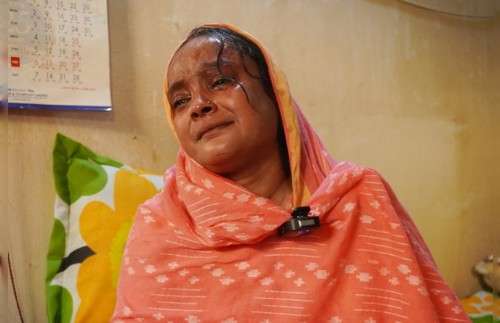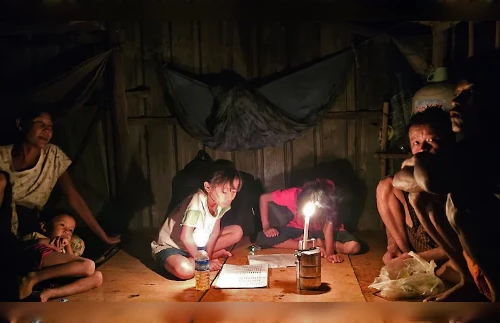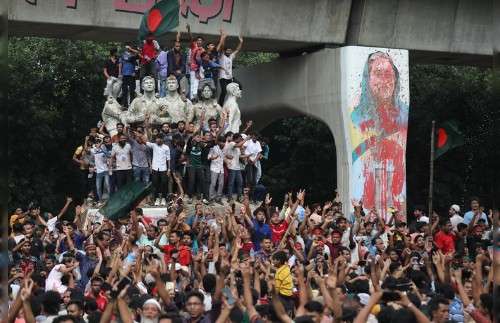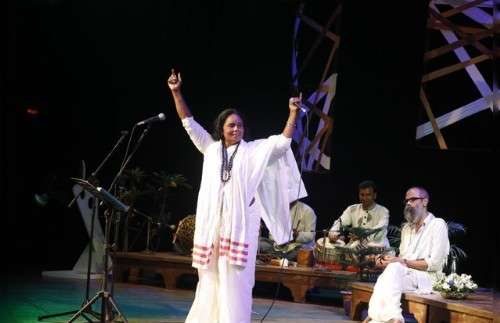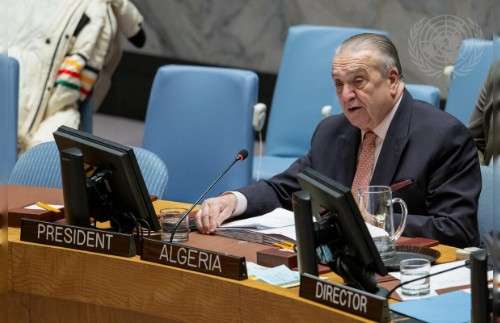Harry Pearl and Nontarat Phaicharoen/Bangkok

A few years ago, Chonticha “Lookkate” Jangrew braved tear gas and rubber bullets on the front lines of protests calling for reform of Thailand’s monarchy and its military-scripted constitution.
Now, she is working to overturn that system – by working within it.
Chonticha is part of a new guard of young candidates looking to harness the energy of the pro-democracy protest movement to shake up Thai politics as the country heads to a general election on Sunday.
The 30-year-old, who was a key strategist in the youth-led democracy protests that roiled Thailand in 2020-21, is running for the progressive Move Forward Party in the May 14 polls, pushing its message of economic equality, political freedom and an end to the military’s grip on power.
“I believe we cannot change our country by only protests on the street. We have to work together on the streets and in parliament,” Chonticha told BenarNews.
From the back of a pickup truck festooned with campaign posters, Chonticha tried to persuade residents surrounding Nava Nakorn – one of Thailand’s biggest industrial estates on the outskirts of Bangkok – to support her vision earlier this week. Armed with a microphone, she spoke to people at roadside restaurants, workshops and markets – provoking waves and at least one three-fingered “Hunger Games” salute as she went by.
Opinion polls last week showed that Move Forward is on track to win the second highest number of seats in the House of Representatives, leaving it well placed to partake in a government that could end nine years of military-dominated rule. Thailand’s main opposition party Pheu Thai, led by Paetongtarn Shinawatra, the 36-year-old daughter of former Prime Minister Thaksin, is leading polling.
Move Forward’s campaign messages like changing the constitution, loosening the power of monopolies and reforming the country’s strict royal defamation law, known as Lèse-Majesté, have found an eager audience among young Thais. Gen Z and Y account for 41.65% of eligible voters this year, according to the Ministry of Interior.
“If I become an MP in parliament, I want to push all those demands from civil society, from the street and from the protests into law and into policies,” Chonticha said, while taking a break from campaigning at a Starbucks in Pathum Thani, a province north of Bangkok where she is running for one of seven seats up for election.
The party’s clever use of social media and its 42-year-old Havard-educated leader, Pita Limjaroenrat, have also endeared it to younger voters, observers say.
Titanium Paiplod, 20, an engineering student at Thammasat University, said Move Forward’s pledge to reform Lèse-Majesté was one of the main reasons she would vote for the party.
“I think Pita will give me a better life … all of the conservative parties still have the same mindset about politics, so it is not making our country progress,” she told BenarNews.
Many first-time voters know nothing but life under former Army Gen. Prayuth Chan-o-cha, said another activist-turned-candidate, Piyarat “Toto” Chongthep.
“Half of their lives were under military pressure,” said the Move Forward candidate. “So they want to taste the full-fledged democracy.”

Prayuth, a staunch royalist who has led the country since 2014 – first as the junta chief and later as a prime minister following the 2019 general election – has cracked down on democratic freedoms and presided over an economy that the World Bank said last year was the most unequal in East Asia and the Pacific.
Piyarat said he wanted to erase the legacy of the coup.
“I want to amend all flawed structures in the constitution – be they senators, electoral rules and the 20-year national strategy.”
For many young Thais, they view the nation’s economic disparities as deeply intertwined with the less-than-democratic nature of the political system, analysts say.
“They perceive that promoting liberties and freedoms can help the government restructure the budget for them,” said Titipol Phakdeewanich, a political scientist at Ubon Ratchathani University.
Chonticha, who says she has had 28 criminal cases brought against her, including two for Lèse-Majesté, added that improving social welfare coverage and economic equality would not happen “without talking about reform of politics.”
“If we reduce the budget to the military or the royal family and use that money to build a welfare state, I think a lot of Thai people can have a better life,” she said.
While opinion polls show growing support, Move Forward will need to enter a coalition, most likely led by Pheu Thai, for Chonticha to get close to enacting her agenda.
Still, many analysts foresee the military clinging to power in one way or another after the vote, thanks primarily to a 2017 constitution which, critics say, gives the generals a lop-sided edge in the post-polls formation of governments.
A total of 250 senators – all hand-picked by Prayuth’s administration – will vote with Parliament’s lower house to elect the prime minister, so a party must win at least 376 of the 500 seats available to secure a majority.
Other observers have raised the possibility of authorities dissolving Move Forward or Pheu Thai after the election.
Future Forward, the predecessor to Move Forward, was disbanded after the 2019 polls for violating electoral rules. Its leaders, including auto-parts tycoon Thanathorn Juangroongruangkit, were barred from political office for a decade.
When asked how she remained optimistic in the face of such constitutional challenges, Chonticha was quick to reply.
“If we don’t dream big, we will just stay quiet and not do anything at all — and the country will never change,” she said. “For my generation, I feel I have no choice but to fight for our future.”
Copyright ©2015-2022, BenarNews. Used with the permission of BenarNews.





